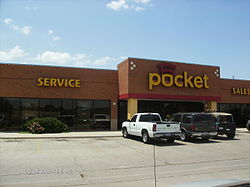A personal communications service (PCS) is set of communications capabilities that provide a combination of terminal mobility, personal mobility, and service profile management. This class of services comprises several types of wireless voice or wireless data communications systems, typically incorporating digital technology, providing services similar to advanced cellular mobile or paging services. In addition, PCS can also be used to provide other wireless communications services, including services that allow people to place and receive communications while away from their home or office, as well as wireless communications to homes, office buildings and other fixed locations. Described in more commercial terms, PCS is a generation of wireless cellular-phone technology, that combines a range of features and services surpassing those available in analogue- and first-generation (2G) digital-cellular phone systems, providing a user with an all-in-one wireless phone, paging, messaging, and data service.
Rogers Wireless Inc. is a Canadian mobile network operator headquartered in Toronto, providing service nationally throughout Canada. It is a wholly owned subsidiary of Rogers Communications. The company had revenues of just under $15.1 billion in 2018. Rogers Wireless is the largest wireless carrier in Canada, with 13.7 million subscribers as of Q2 2023.
GSM frequency bands or frequency ranges are the cellular frequencies designated by the ITU for the operation of GSM mobile phones and other mobile devices.

Alltel was a landline, wireless and general telecommunications services provider, primarily based in the United States. Before its wireless division was acquired by Verizon Wireless and AT&T, Alltel provided cellular service to 34 states and had approximately 13 million subscribers. As a regulatory condition of the acquisition by Verizon, a small portion of Alltel was spun off and continued to operate under the same name in six states, mostly in rural areas. Following the merger, Alltel remained the ninth largest wireless telecommunications company in the United States, with approximately 800,000 customers. On January 22, 2013, AT&T announced they were acquiring what remained of Alltel from Atlantic Tele-Network for $780 million in cash.
United States Cellular Corporation is an American mobile network operator. Its stock is publicly traded, but Telephone and Data Systems Inc. owns a controlling stake. The company was formed in 1983 and is headquartered in Chicago, Illinois. UScellular is the fifth-largest wireless carrier in the United States, with 4,656,000 subscribers in 426 markets in 21 states as of the 2nd quarter of 2023.

Sprint Corporation was an American telecommunications company. Before being acquired by T-Mobile US on April 1, 2020, it was the fourth-largest mobile network operator in the United States, serving 54.3 million customers as of June 30, 2019. The company also offered wireless voice, messaging, and broadband services through its various subsidiaries under the Boost Mobile and Open Mobile brands and wholesale access to its wireless networks to mobile virtual network operators.

Metro by T-Mobile is an American prepaid mobile virtual network operator (MVNO) wireless service provider and brand owned by T-Mobile US. It previously operated the fifth largest mobile telecommunications network in the United States using code-division multiple access (CDMA). In 2013, the carrier engaged in a reverse merger with T-Mobile US; post-merger, its services were merged under T-Mobile's UMTS and LTE network. Metro by T-Mobile competes primarily against Dish's Boost Mobile, AT&T's Cricket Wireless and Verizon's Visible as part of the wireless service provider brands.

Cricket Wireless is an American prepaid mobile virtual network operator (MVNO), wholly-owned by AT&T. It provides wireless services to ten million subscribers in the United States. Cricket Wireless was founded in March 1999 by Leap Wireless International. AT&T acquired Leap Wireless International in March 2014, and later merged Cricket Wireless operations with Aio Wireless. Cricket Wireless competes primarily against T-Mobile's Metro by T-Mobile, EchoStar's Boost Mobile and Verizon's Visible in the prepaid wireless segment.

Claro Company, known as Claro Mexico in Mexico, or simply Claro, is a Latin American telecommunications company, part of América Móvil, a Mexican telecom group. Claro serves clients in Argentina, Brazil, Chile, Colombia, Costa Rica, the Dominican Republic, Ecuador, El Salvador, Guatemala, Honduras, Mexico, Nicaragua, Panama, Paraguay, Peru, Puerto Rico and Uruguay. The company's name means "bright," "clear," and also "of course," in both Portuguese and Spanish.
LG Uplus Corp. (Korean: LG유플러스; stylized as LG U+, KRX: 032640) is a South Korean mobile network operator owned by LG Corporation. It was formerly known as LG Telecom, but changed to its current name on July 1, 2010. LG Uplus is the third-largest wireless carrier in South Korea, with 16.652 million subscribers as of Q4 2020.
The term, Subsidy Password, is used by Motorola and other handset manufacturers to refer to the 8-digit code unlock code necessary to remove the operator lock from cell phones. This code is randomly assigned to individual cell phones by the OEM on request of the mobile service operator and prevents the use of a particular phone on a cellular network other than that to which the phone was originally sold.
Kyocera Communications, Inc. is an American manufacturer of mobile phones for wireless service providers in the United States and Canada. Kyocera Communications, Inc. is a wholly owned subsidiary of Kyocera Corporation, which also manufactures mobile phones for the Japanese wireless market under various brands.
Leap Wireless International, Inc. was a telecommunications operator that provided wireless services to approximately 4.6 million subscribers, the 5th largest, through its subsidiary, Cricket Communications, Inc.. It was headquartered in San Diego, California. Leap Wireless and Cricket Wireless are now subsidiaries of AT&T.

West Central Wireless was a local mobile phone provider serving Central and West Texas based in San Angelo, Texas, until their acquisition by Verizon Wireless in 2023. Their cellular services consisted of 850 MHz HSPA+ and GSM networks and an overlayed 700 MHz LTE network. The HSPA+ network began rollout in early 2012. CDMA services once existed due to the acquisition of Five Star Wireless, offering wholesale roaming to service providers, though services were discontinued in 2019.

Nextel Communications, Inc. was an American wireless service operator that merged with and ceased to exist as a subsidiary of Sprint Corporation, which would later be bought by T-Mobile US and folded into that company. Nextel in Brazil, and formerly in Argentina, Chile, Peru, the Philippines, and Mexico, is part of NII Holdings, a stand-alone, publicly traded company not owned by Sprint Corporation.
Consumer Cellular, Inc. is an American postpaid mobile virtual network operator founded by John Marick and Greg Pryor in Portland, Oregon in October 1995. The company offers cellphones, no-contract cellphone plans, and accessories with a focus on users over age 50. Including its corporate headquarters in Scottsdale, Arizona, Consumer Cellular is completely U.S. based, employing more than 3,100 people in Arizona, Oregon, Oklahoma, Kentucky and Texas.

The LG Optimus One is an entry-level series of touch-screen smartphones manufactured by LG Electronics, Inc. It was released running the Android 2.2 Froyo, and later LG released software to upgrade it to Android 2.3 Gingerbread. Although the basic physical form factor of each variant is the same, the variants have differences in hard button shape and layout, the form of the metal side bezel and the user interfaces added by LG or various carriers. Versions of the Optimus One exist that operate on various frequency bands and either GSM or CDMA-based network protocols. They may also feature one or more variations in hardware, such as a faster processor, the addition of a physical keyboard, a modem with higher theoretical speeds, or a better digital camera.

mobi, Inc. is a wireless carrier founded in 2004 and based in Honolulu, Hawaiʻi. The company provides service on each of the major islands of Hawaiʻi, as well as on the mainland United States through roaming agreements with other carriers.









